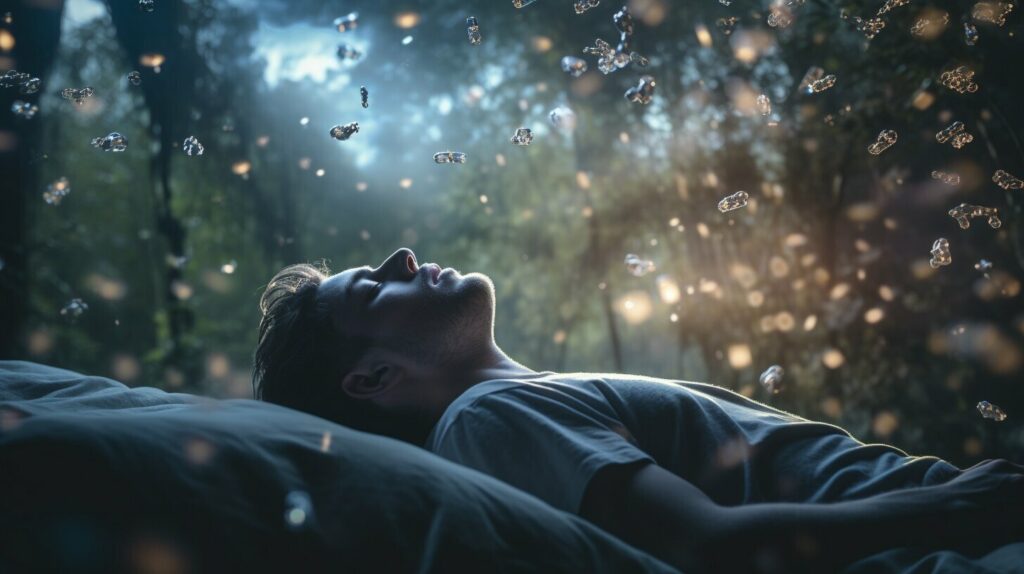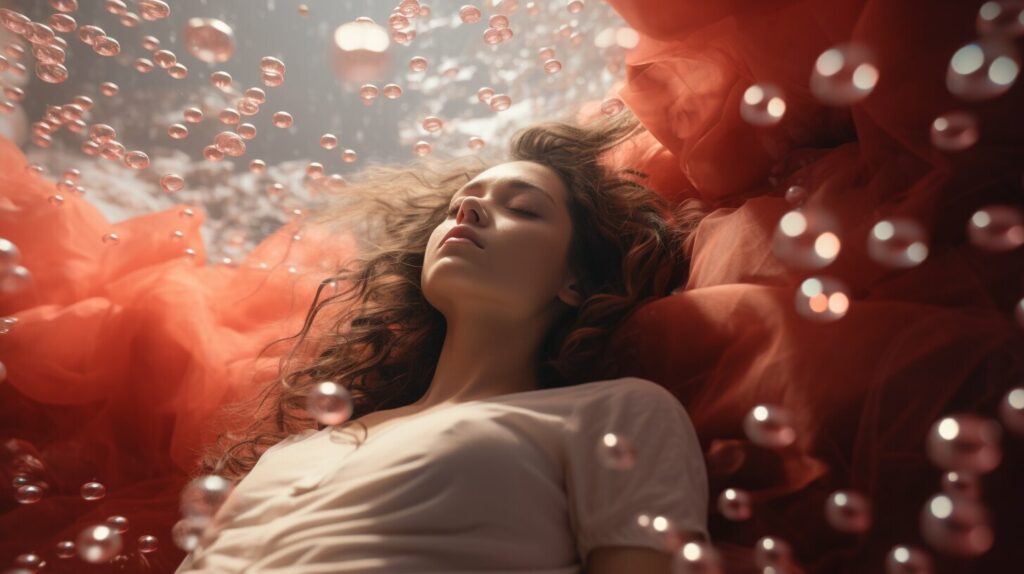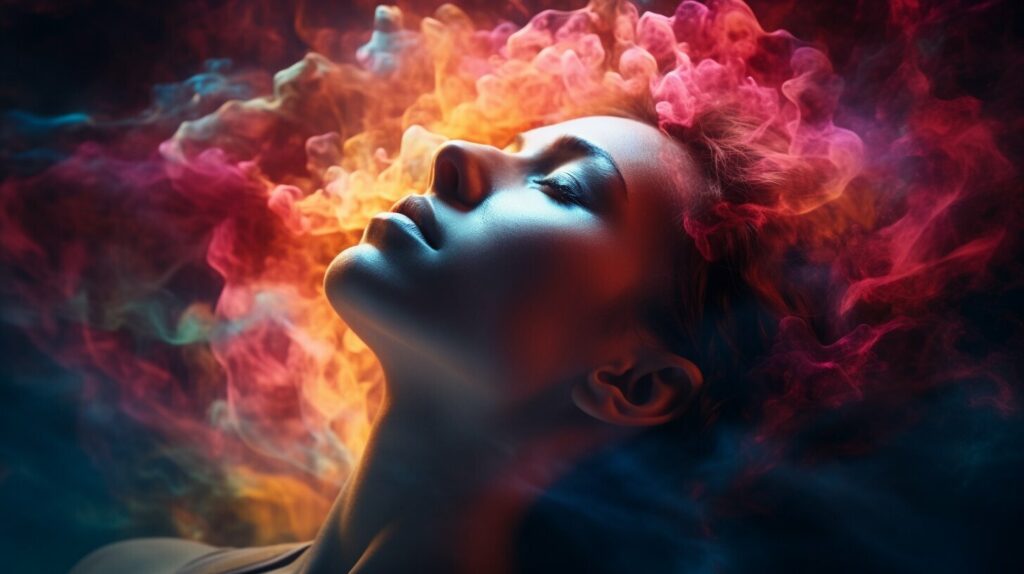Have you ever taken an antihistamine before bed and experienced unusually vivid dreams? Many people have reported intense and memorable dream experiences while taking these medications, leading to speculation about a possible link between antihistamines and lucid dreaming.
But what are antihistamines, and how do they affect the body? And what exactly are lucid dreams? In this article, I’ll explore the potential connection between antihistamines and lucid dreams and provide insights into the mechanisms behind these experiences.
Key Takeaways
- Antihistamines may potentially cause lucid dreams
- Lucid dreams involve increased awareness and control over dream content
- Antihistamines can affect sleep quality and dream recall
- Further research is needed to definitively establish a connection between antihistamines and lucid dreams
Understanding Antihistamines and Their Side Effects
Antihistamines are medications commonly used to treat allergic reactions, such as hay fever, hives, and itching. They work by blocking the effects of histamines, which are chemicals released by the body in response to an allergen. This helps to relieve symptoms such as sneezing, runny nose, and itchy eyes.
While antihistamines are generally considered safe and effective, they can have side effects. The most common side effect is drowsiness, which is why many antihistamines are marketed as sleep aids. However, this drowsiness can also affect daytime functioning and lead to reduced alertness and concentration.
Other potential side effects of antihistamines include dry mouth, nausea, blurred vision, and constipation. In rare cases, some individuals may experience more serious side effects such as difficulty breathing or a fast or irregular heartbeat.
It is important to talk to your healthcare provider before taking antihistamines, especially if you have any other medical conditions or are taking other medications. They can provide guidance on the most appropriate type and dosage of antihistamine for your needs, as well as any potential risks or interactions to watch out for.
Image source:

The Basics of Lucid Dreams
Lucid dreams are a type of dream where the dreamer is aware that they are dreaming. During lucid dreaming, the dreamer can actively participate in the dream by making conscious decisions and controlling the dream’s content. These types of dreams can be incredibly vivid and can feel just as real as waking life.
There are different levels of lucidity that one can experience during a lucid dream. Some individuals may only become aware that they are dreaming but cannot control the dream’s content, while others may have complete control over their dreams.
Lucid dreams are not a new phenomenon and have been documented throughout history. However, it is only in recent years that more scientific research has been conducted on this type of dream.
Research suggests that lucid dreaming occurs during the rapid eye movement (REM) stage of sleep. REM sleep is a crucial stage of sleep as it is associated with memory consolidation and emotional regulation. During the REM stage, the brain becomes more active, and the eyes rapidly move back and forth. This stage of sleep is where most vivid and memorable dreams occur.
Now that we have a basic understanding of lucid dreams, we can dive deeper into the potential connection between antihistamines and dreaming.

The Link Between Antihistamines and Dreaming
Research has shown that antihistamines may affect the quality and frequency of dreaming experiences. While anecdotal evidence suggests that antihistamines can cause vivid and even lucid dreams, scientific studies have produced mixed results.
One study published in the Journal of Sleep Research found that participants who took a single dose of diphenhydramine, a common antihistamine, reported having more dream activity and more vivid dreams than those who took a placebo. However, another study published in the same journal found no significant difference in dream recall between individuals who took diphenhydramine and those who took a placebo.
Despite the conflicting results, many individuals who take antihistamines report experiencing more vivid and memorable dreams. This may be due to the medications’ effects on sleep quality and architecture, particularly rapid eye movement (REM) sleep.
REM sleep, which occurs throughout the night but is most abundant during the latter portion of the sleep period, is closely associated with dreaming. Antihistamines may disrupt the natural REM sleep cycle, causing individuals to have more intense and memorable dream experiences.
It is important to note that the effects of antihistamines on dreaming can vary depending on individual factors, such as dosage and timing of medication. Additionally, other factors, such as stress, anxiety, and sleep environment, can also influence the nature of dream experiences.
If you are experiencing dream disturbances while taking antihistamines, it is advisable to speak with your healthcare provider. They may suggest adjusting the dosage or timing of medication or recommend alternative treatments for allergy symptoms.
In the next section, we will explore the potential impact of antihistamines on sleep quality and disturbances.

Antihistamines and Sleep Disturbances
As we discussed earlier, antihistamines can have an impact on sleep quality and disturbances. One of the main culprits is the medication’s effect on rapid eye movement (REM) sleep, which is the stage of sleep when most dreaming occurs.
Studies have shown that antihistamines can reduce the amount of REM sleep a person experiences, leading to fewer dreams and potentially less restful sleep overall. This reduction in REM sleep can also make it more difficult for individuals to recall any dreams they do have while taking antihistamines.
It’s worth noting that the extent to which antihistamines affect REM sleep can vary from person to person and may depend on factors such as dosage and timing of medication. But if you’re experiencing any disruptions to your sleep or dreaming patterns while taking antihistamines, it may be worth speaking to your healthcare provider about alternative options or coping strategies.

The Role of REM Sleep in Lucid Dreaming
REM sleep, or rapid eye movement sleep, is a crucial stage of the sleep cycle that is closely associated with dreaming. During REM sleep, the brain is highly active, and the body is essentially paralyzed to prevent acting out dream scenarios.
Research suggests that lucid dreaming is most likely to occur during REM sleep, as this is when the brain is in a highly active and imaginative state. In fact, a 2017 study found that individuals who were more successful at inducing lucid dreams had higher levels of REM sleep activity.
So, what does this have to do with antihistamines? Well, some research suggests that antihistamines can actually reduce REM sleep, leading to a potential decrease in dream activity overall. While the exact mechanism is not fully understood, it is thought that antihistamines may block the action of acetylcholine, a neurotransmitter that plays a role in the regulation of REM sleep.
This reduction in REM sleep could potentially have an impact on the occurrence of lucid dreams. If REM sleep is disrupted or reduced, it may be more difficult for individuals to enter a state of consciousness during their dreams.

It’s worth noting that the impact of antihistamines on REM sleep may vary depending on the specific medication and individual factors. Some studies have found no significant effects on REM sleep, while others have reported a decrease in the amount or intensity of REM sleep. Plus, it’s important to keep in mind that other factors, such as sleep quality and overall health, can also influence the occurrence of lucid dreams.
Overall, while the exact connection between antihistamines and lucid dreams is still being explored, it’s clear that REM sleep plays a critical role in the occurrence of these vivid dream experiences. By better understanding the impact of antihistamines on sleep and dreaming, we can gain further insights into the potential connection between these medications and lucid dreams.
The Personal Side of Antihistamines and Dreams
While there is no definitive evidence on the link between antihistamines and lucid dreams, many individuals have reported personal experiences with vivid and memorable dreams while taking these medications. As someone who has taken antihistamines regularly for allergies, I can attest to experiencing more intense and memorable dreams on occasion.
One person on a popular online forum shared, “I’ve been taking antihistamines for a few months and it’s given me really vivid dreams. I usually don’t remember my dreams, but now I wake up remembering lots of details.” Another individual said, “Whenever I take an antihistamine, I have really weird and vivid dreams. Sometimes they’re nightmares, but mostly they’re just really strange.
It is important to note that individual experiences may vary, and not everyone who takes antihistamines will have changes in their dream patterns. However, these personal anecdotes do raise interesting questions about the potential impact of these medications on dreaming.

In some cases, individuals may be curious or concerned about the impact of antihistamines on their sleep quality and overall wellbeing. While antihistamines can be helpful for managing allergy symptoms, they may also have side effects that can affect sleep patterns. It is important to prioritize overall sleep health and speak with a healthcare provider if you have any concerns.
Next, we will explore other factors that can influence dreaming while taking antihistamines, including dosage, timing of medication, and individual differences.
Factors That Influence Dreaming While Taking Antihistamines
While antihistamines have been linked to changes in dream patterns, it is important to consider other factors that may also play a role in dream disturbances.
Firstly, the dosage and timing of medication can impact its effects on the body. Taking antihistamines too close to bedtime may result in drowsiness and affect the ability to enter REM sleep, which is essential for dreaming. It is important to follow the recommended dosage instructions provided by a healthcare provider.
Additionally, individual differences can play a role in the impact of antihistamines on dreaming. Some individuals may be more sensitive to the medication’s effects, while others may not notice any changes in their sleep or dreaming patterns at all.
Finally, interactions with other medications can also affect dreaming while taking antihistamines. It is important to speak with a healthcare provider about all medications being taken to understand how they may interact with each other.
By understanding these factors, individuals can better manage and minimize any potential negative impact on their sleep and dreaming patterns while taking antihistamines. It is important to prioritize overall sleep health and speak with a healthcare provider if any concerns arise.

The Role of REM Sleep in Lucid Dreaming
REM sleep, or rapid eye movement sleep, is a crucial stage of the sleep cycle that is closely associated with dreaming. During REM sleep, the brain is highly active and the body experiences muscle paralysis, which is a protective mechanism to prevent acting out dreams. It is during this stage of sleep that most vivid and memorable dreams occur.
Antihistamines have been shown to reduce the amount of time spent in REM sleep, which can lead to a decrease in dream frequency and recall. This may explain why some individuals report a decrease in dream activity while taking antihistamines.
It is important to note that not all antihistamines have the same impact on sleep and dreaming. Some types, such as diphenhydramine, have a greater effect on REM sleep than others. Additionally, the dosage and timing of medication can also influence its impact on sleep.

While the impact of antihistamines on REM sleep and dreaming may vary, it is essential to prioritize overall sleep health. This includes maintaining a consistent sleep schedule, avoiding caffeine and alcohol close to bedtime, and creating a comfortable sleep environment.
If you are experiencing dream disturbances while taking antihistamines, it is important to talk to your healthcare provider. They can provide guidance on managing side effects and may recommend alternative treatment options.
Conclusion
In conclusion, while there is some evidence and anecdotal reports suggesting a potential link between antihistamines and lucid dreams, further research is needed to fully understand this connection. As I explored throughout this article, antihistamines can have various effects on the body, including impacting sleep quality and dream recall. Additionally, individual factors and other medications may contribute to any disturbances in dreaming.
If you are experiencing changes in your dreams or sleep quality while taking antihistamines, it is important to speak with your healthcare provider. They can help determine if these medications are the cause and provide guidance on how to manage any related symptoms.
Overall, maintaining good sleep hygiene and prioritizing sleep health is crucial for our overall well-being. While antihistamines can provide relief for allergy symptoms, it is important to be aware of their potential side effects and how they might impact our sleep and dreaming experiences.
FAQ
Q: Can antihistamines cause lucid dreams?
A: While there is anecdotal evidence and some studies suggesting a potential link between antihistamines and lucid dreams, further research is needed to definitively establish this connection. It is important for individuals to speak with their healthcare providers if they have any concerns about their dreams or the use of antihistamines.
Q: What are the side effects of antihistamines?
A: Antihistamines can have various side effects, including drowsiness, dry mouth, blurred vision, and dizziness. It is important to understand the potential impact these medications can have on sleep and dreaming. Consulting with a healthcare provider can help individuals better understand the side effects and make informed decisions.
Q: What are lucid dreams?
A: Lucid dreams are dreams in which the dreamer is aware that they are dreaming. This awareness allows individuals to have some level of control over their dreams and can result in vivid and memorable dream experiences. Understanding the basics of lucid dreaming can help in exploring their potential connection with antihistamines.
Q: Is there a link between antihistamines and dreaming?
A: Studies and anecdotal evidence suggest that antihistamines may affect dream recall and the overall quality of dreams. However, individual experiences can vary, and more research is needed to fully understand the connection between antihistamines and dreaming. Consulting with a healthcare provider can provide further insights.
Q: How do antihistamines affect sleep disturbances?
A: Antihistamines can potentially impact sleep quality and disturbances. These medications may affect sleep architecture, including REM sleep, which is closely associated with dreaming. Understanding the influence of antihistamines on sleep can provide insights into their potential effects on dreaming.
Q: What is the role of REM sleep in lucid dreaming?
A: REM sleep plays a crucial role in the occurrence of lucid dreams. It is during REM sleep that dreams are most vivid and memorable. The potential influence of antihistamines on REM sleep patterns can help explain their possible connection to lucid dreaming.
Q: What do personal experiences and testimonials say about antihistamines and dreaming?
A: Personal experiences and testimonials from individuals who have taken antihistamines suggest varying effects on dreaming and sleep quality. These accounts provide a subjective perspective and contribute to the ongoing exploration of the potential impact of antihistamines on dreams and sleep.
Q: What factors influence dreaming while taking antihistamines?
A: Several factors can influence dreaming while taking antihistamines, including dosage, timing of medication, individual differences, and interactions with other medications. Considering these factors can provide a more comprehensive understanding of the potential connection between antihistamines and lucid dreams.
Q: Are there tips for managing dream disturbances while taking antihistamines?
A: Yes, individuals who experience dream disturbances while taking antihistamines can try various strategies to manage and improve their sleep quality. These may include practicing good sleep hygiene, creating a comfortable sleep environment, and discussing alternative medication options with a healthcare provider.






